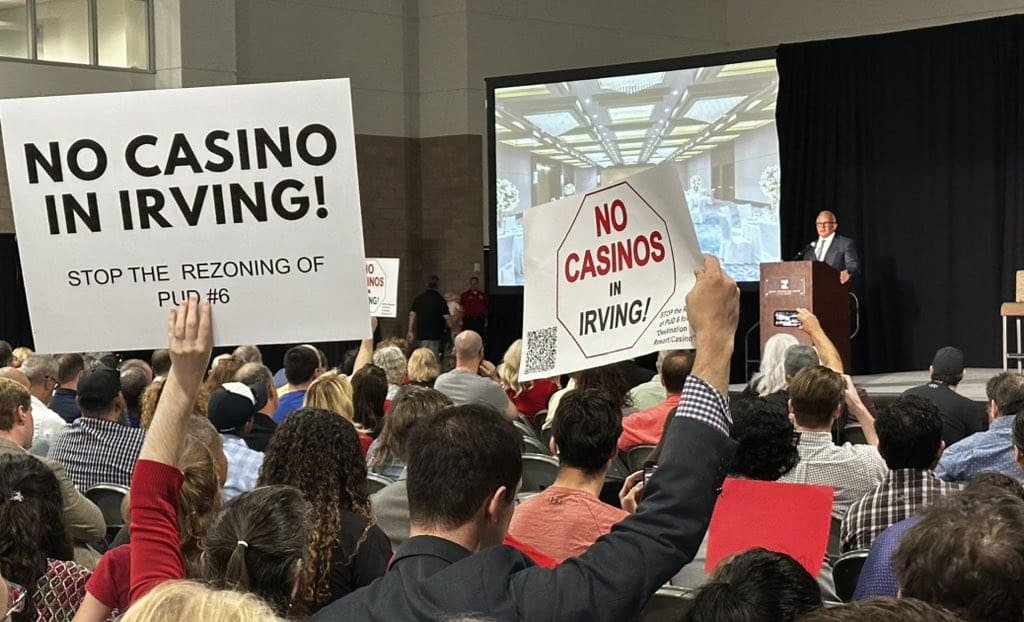The Battle Over the Proposed Las Vegas Sands Casino in Irving, Texas: Power, Politics, and Public Trust
The city of Irving, Texas, recently found itself at the center of a brewing controversy surrounding a proposal to build a Las Vegas Sands casino. What began as a debate over potential economic benefits and community impact quickly spiraled into questions about transparency, corporate influence, and ethics. As the heated discussion played out, an unexpected twist emerged—the discovery of anonymous mass text messages sent to residents, sparking further tension and investigations. The unfolding events have cast a spotlight on the intersection of local politics, corporate interests, and the power of public opposition.
The Mystery of Mass Texts
Irving residents were left scratching their heads when an influx of text messages about the casino proposal flooded their phones. These messages, aimed at shaping public opinion and garnering support for the project, left a trail of confusion in their wake. Upon closer inspection, it was revealed that the campaign was orchestrated by Clear Insights, a research data firm, working alongside groups advocating for the casino. But the tactics employed by these groups raised concerns.
Some individuals who appeared at city council meetings to support the casino later admitted they had been recruited through these texts. They were offered $250 incentives to participate and even required to sign non-disclosure agreements (NDAs). This strategy cast doubts on whether the support for the casino was genuine or merely manufactured through financial incentives. The ethical questions raised by these revelations underscored a deeper unease among residents about the integrity of the campaign.
A Deeply Divided Community
The proposed casino elicited a wide range of opinions within the Irving community. Supporters of the project pointed to the potential for economic growth, job creation, and increased tax revenues, arguing that such a development could transform Irving into a major entertainment destination. Conversely, opponents voiced concerns about the possible social costs, such as higher crime rates, gambling addiction, and the erosion of community values.
Many residents saw the project as prioritizing corporate profits over the well-being of the community. Their vocal resistance at public meetings and online forums evidenced a growing frustration with efforts to push the casino through, especially given the questionable recruitment tactics exposed by the text campaign.
Even among city leaders, the casino proposal deeply divided opinions. Councilman Dennis Webb lamented the city’s reluctance to seize what he saw as a significant economic opportunity. However, Councilman Luis Canosa stood firmly on the side of caution, criticizing the pro-casino lobbying efforts and emphasizing the need for transparency and accountability in decision-making. His skepticism of the orchestrated protests resonated with many residents who were wary of manipulation by outside interests.
Behind-the-Scenes Power Plays
The discovery of mass texts was only one layer of the controversy. The push to establish the casino revealed a web of political consultants, lobbyists, and corporate players working behind the scenes. Among the key figures supporting the casino was Randle Meadows, a consultant from Murphy Nasica—a firm with ties to Sands-funded candidates in Texas. Meadows’s appearance at a public meeting further complicated matters when questions arose about whether he even resided in Irving, as he had claimed.
Additionally, Echo Canyon Consulting (ECC), a politically influential firm specializing in shaping public opinion, played a substantial role in promoting the casino initiative. Their involvement highlighted just how much was at stake for the Las Vegas Sands Corporation, which appeared determined to gain a foothold in Texas despite the state’s stringent gambling laws.
The Roadblock of Gambling Laws in Texas
A major obstacle standing in the way of the casino proposal is Texas's legal stance on gambling. Despite the Sands Corporation framing the casino as part of a broader vision for a “destination resort,” gambling remains illegal in Texas. Amending the state’s laws to permit such a development would require not only legislative approval but also the backing of Texas voters.
The Sands Corporation’s efforts to sway public opinion and create a groundswell of support for the casino met fierce resistance from residents and lawmakers alike. For many, the potential economic benefits were overshadowed by fears of long-term harm to the community.
Trust, Transparency, and the Fight for Community Values
At its core, the controversy surrounding the Irving casino proposal is about more than just gambling or economics; it’s a reflection of the community’s struggle to maintain trust in its institutions and leaders. The involvement of powerful corporate entities like the Las Vegas Sands Corporation raised questions about how much influence such groups should wield over local politics.
Councilman Luis Canosa captured the public’s sentiment by calling out corporate interests trying to tip the scales in their favor. His insistence on integrity over influence galvanized resident opposition and reinforced the importance of holding elected officials accountable.
The Outcome: A Tentative Victory for the People
For now, the casino proposal appears to be stalled, thanks to vocal opposition from Irving residents and the challenges posed by Texas law. The saga serves as a potent reminder that public voices can still have a significant impact, even when facing immense corporate power.
As Irving reflects on this contentious chapter, one thing is clear: residents expect transparency, accountability, and policies that put their well-being above corporate profits. And while the Las Vegas Sands Corporation may continue its efforts, the people of Irving have shown they are ready to stand their ground to protect their community’s values.
